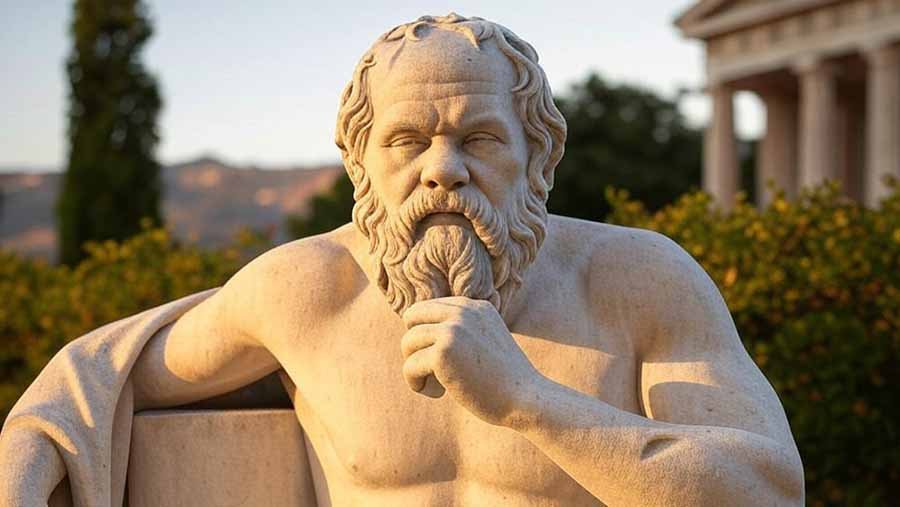
When it comes to philosophy, we can’t ignore Socrates—often called the “Father of Western Philosophy”.
As Socrates refused to write a single word, his disciple Plato preserved his thoughts and ideas through writings.
Glad he did it because it is facinating how his thoughts on society are as relevant today as they were in acnient Athens.
So, I am covering here 9 points Socrates made about society. Further, I have tried to explain them with modern examples.
1. Self-Reflection
“The unexamined life is not worth living.”
Socrates made this profound statement when he was on his trial. Socrates believes and emphasizes that self-reflection is important.
The idea here is that one should not live a life just for mere survival. You should live consciously. Examine your beliefs, values, and actions to make your life purposeful.
What It Means in Today’s Society
Today, you can translate it to questioning the life choices that you make according to certain societal standards and expectations.
Like in personal life, many people follow societal expectations without questioning them. They pursue careers they don’t enjoy. They get married not because they want to but because they feel pressure from family and traditions.
Social media is another example that promotes unexamined lives. You scroll through social media posts and start comparing your lives with the seemingly perfect lives of others. You try to conform to what is popular without questioning its impact on your well-being.
2. Truth Over Popular Opinion
“False words are not only evil in themselves, but they infect the soul with evil.”
Socrates says lies and deceit are harmful because they distort reality and break mutual trust.
When someone lies, they think they are only affecting the other people. But it’s not the whole truth. Lies harm both, the liar and the person who believes or acts upon them. The more someone lies, the more desensitized they become to the truth. Their ethical standards degrade over time.
He warns against corrupting your soul through dishonesty, as it is a profound moral failure. Corrupt souls distance themselves from the pursuit of virtue, wisdom, and self-knowledge.
He emphasizes recognizing evil in false words and finding hidden truths behind them.
What It Means in Today’s Society
We live in a world where social media is dominating and misinformation is rising day by day.
Like it happened during the COVID-19 pandemic. There was a lot of misinformation about vaccines that spread widely. Many people believed and acted on these false claims because they were popular. Many people didn’t bother to fact-check them.
Further, there is a rise of cancel culture and groupthink.
For example, people cancel a public figure or celebrity for their out-of-context statement. People join the bandwagon without thinking twice and become a part of the mob mentality.
3. Be Aware of Flattery
“Think not those faithful who praise all thy words and actions; but those who kindly reprove thy faults.”
Socrates says that it is important to differentiate between superficial praise and genuine support.
Be aware of people who constantly agree with you, because you don’t know what is motivating them to do so. Maybe their agreements are driven by fear, selfish motives, or lack of concern for your growth.
True friends or allies are those who don’t ignore your shortcomings and care enough to correct you when you are wrong. Loyalty is not about blind affirmation but about contributing to each other’s personal development.
What It Means in Today’s Society
People are inclined to surround themselves with like-minded individuals who agree with their views, creating an eco chamber. However, they forget that it limits their personal growth and ability to think critically.
For example, influencers who look only for followers praising them may miss valuable feedback that could help them improve.
Further, if we talk about workplaces, those bosses who surround themselves with flattering employees can suffer from poor decision-making.
Similarly, in a relationship, a true partner is one who points out your mistakes gently to help you grow. If they worry about causing you any discomfort or avoiding any conflict, they may fail to address issues.
4. Virtue is Knowledge
“There is only one good, knowledge, and one evil, ignorance.”
By this quote, Socrates wants to say that knowledge empowers you and helps you make informed, virtuous, and better decisions.
In other words, knowledge is power and ignorance is dangerous.
True wisdom comes from understanding oneself, the world, and the moral principles that govern life. Without this foundation, people cannot live fulfilling lives.
And ignorance leads to poor decisions, unethical actions, and the perpetuation of suffering. When people lack understanding, they act impulsively or selfishly, causing harm to themselves and others.
What It Means in Today’s Society
In the modern world, knowledge underpins progress. It is the knowledge that helps us save lives through continuous scientific advancements in medicine.
Further education better equips citizens to make decisions in democracies, like voting for competent leaders.
Social issues increase when people in society are ignorant. When people lack understanding, they act impulsively or selfishly, causing harm to themselves and others.
Like, ignorance is the cause of which environmental issues are increasing. That’s why there are lack of action on climate change.
5. The Role of Leaders
“I was really too honest a man to be a politician and live.”
Socrates’ perspective informs us that politics often requires compromise. You can’t do politics without manipulation and appeasement of public opinion.
In Socrates’ era, Athenian democracy relied on persuasion and pandering to the masses. Socrates criticized it as it prioritizes popularity over justice.
What happened to Socrates reflects his belief. His unwavering commitment to truth and integrity conflicted with the demands of political life. Such adherence to truth led to his trial and eventual death.
What It Means in Today’s Society
Politicians today often face similar dilemmas. For example, whistleblowers or leaders who expose corruption may face backlash or stricter actions. Powerful entities hate honesty as it threatens their interests.
Like it happens in politics, it happens in everyday life.
For example, in workplaces or industries where everything is competition, people feel pressured to engage in unethical practices for survival or success.
But Socrates doesn’t want us to compromise like this. His words encourage individuals to prioritize integrity, even when it is difficult.
6. Reflect and Question
“To find yourself, think for yourself.”
Socrates suggests that everyone should reflect on who they are.
One must understand where their beliefs, values, and sense of purpose come from. These should arise from within, not be shaped solely by external influences. Do not conform blindly to the crowd, societal norms, or traditions.
Instead, reflect on your thoughts and emotions, and resist the urge to adopt others’ views without question.
What It Means in Today’s Society
In today’s society, people often adopt popular opinions without engaging in critical thinking. They are influenced by social media trends, celebrity or influencer opinions, and peer pressure.
For example, many individuals start sharing a hashtag or supporting a movement simply because it is trending. They do so without understanding why it started, what the cause is, or whether it is valid.
Similarly, countless people follow predetermined life paths dictated by family or societal expectations—pursuing specific careers or achieving milestones like marriage—without questioning if these choices align with their own desires and values.
Socrates’ wisdom emphasizes the importance of researching, understanding, and forming your own stance, even if it means going against the crowd.
7. Moral Responsibility to Society
“Not life, but good life, is to be chiefly valued.”
Socrates believes that life is not just meant to be lived for mere existence. When you are living for basic survival, material needs, or physical well-being, it is called just “Life”.
But, a “Good Life” means you are living in higher pursuit of values like justice, wisdom, courage, and truth.
Socrates suggests that life without moral integrity, self-reflection, and virtue is not worth living. Such a life fails to fulfill the deeper purpose of human existence.
What It Means in Today’s Society
In today’s society, many people are chasing wealth, fame, or status. They equate these with a successful life.
Socrates challenges this notion and suggests that material gains result in an empty existence if there is no ethical living or fulfillment work in your life.
Let’s take an example of a corporate leader who is busy amassing wealth through manipulation and exploitative practices. He may have life but not the “good life”. In contrast, there is a teacher who is making a modest income. But she is transforming the lives of her students through better education. So, she is living the “good life”.
Therefore, it is your social responsibility to dedicate yourself to causes like sustainability, human rights, or community service. This is the way to live a “good life” because you are contributing to the greater good.
8. Beware the Illusion of Knowledge
“I know that I know nothing.”
Socrates emphasizes that the scope of human knowledge is tiny compared to the vastness of what is unknown.
True wisdom begins with recognizing one’s ignorance. Without humility, one can’t develop a thirst for learning and growth.
When you admit ignorance, it is not just intellectual but moral. It’s about being honest with oneself and others.
What It Means in Today’s Society
In today’s world, experts in fields like science or technology often admit how much there is still to discover.
For example, there are mysteries of dark matter and dark energy, and physicists are still exploring them. They admit we barely understand the universe.
In the age of misinformation, critical thinkers remind us to verify facts and question what we “know.”
If you assume you know everything, you are unlikely to seek improvement or learn new truths.
9. Education as the Foundation of Society
“Education is the kindling of a flame, not the filling of a vessel.”
Socrates emphasizes that the focus of education should be to ignite curiosity in individuals. A curiosity that can spark creativity and critical thinking.
Education is a tool for enlightenment, not rote learning.
Effective education is not about passive knowledge transfer or making someone cram facts. Effective education is about the active engagement of learners in the education process.
Learners must take the initiative to explore, question, and reflect.
What It Means in Today’s Society
Modern educators understand the importance of inquiry-based learning rather than memorizing facts. That’s why they focus on making students ask questions and solve problems.
For example, students can learn better about climate change if educators involve them in local environmental projects. It kindles a flame of awareness and action in them, which is much better than merely filling their minds with data.
2024 © socialexperiencehub.com. All rights reserved.






